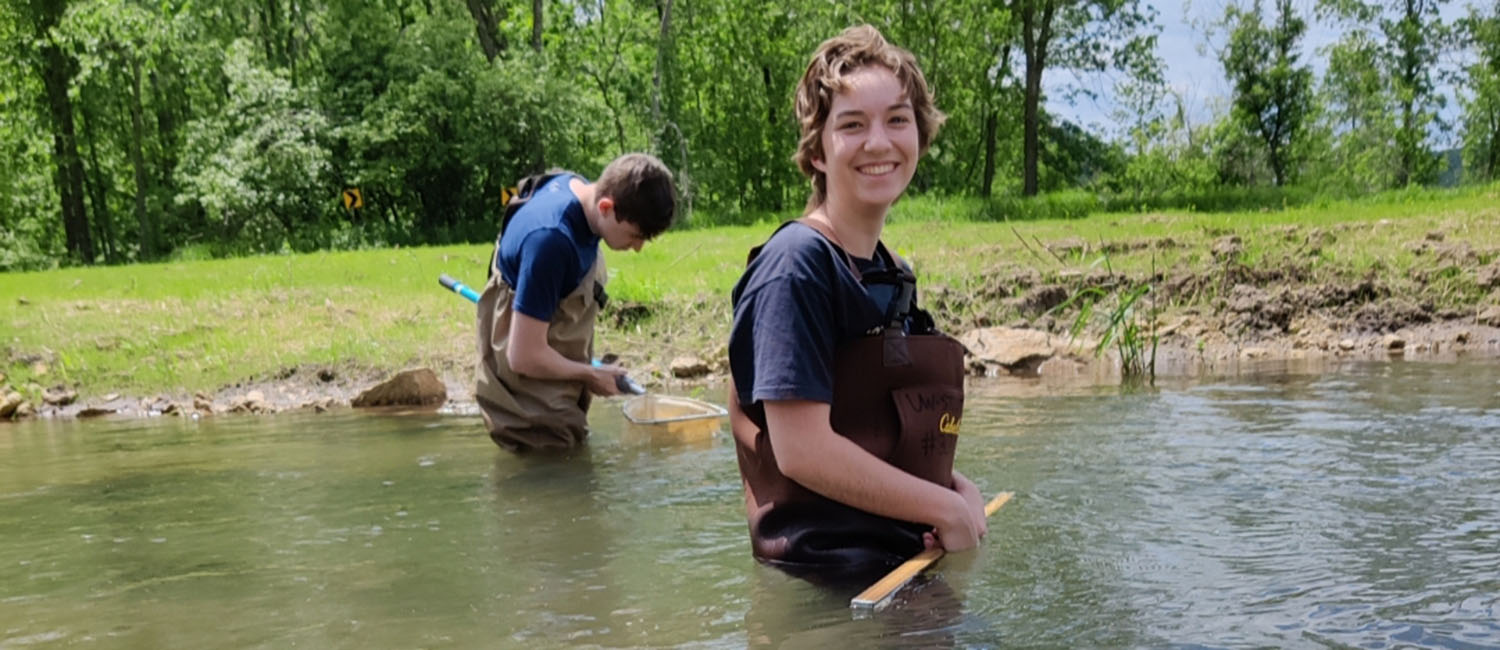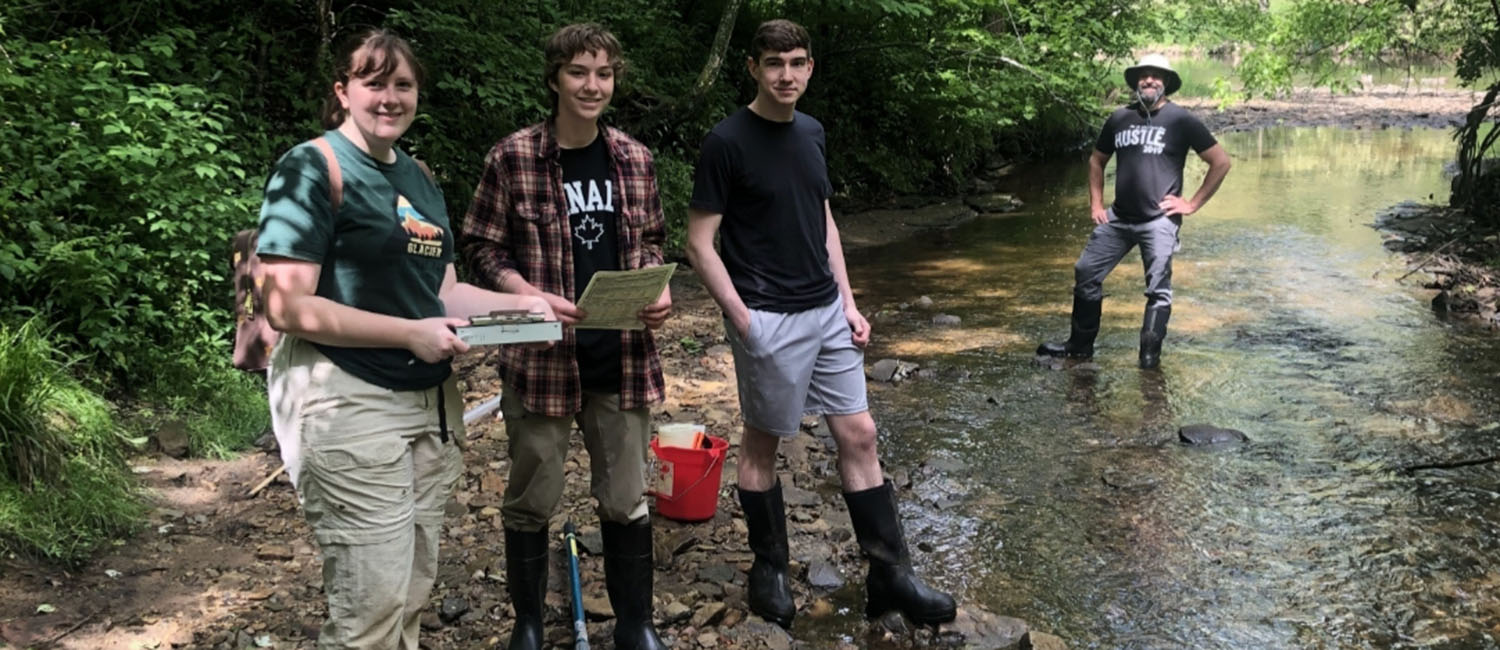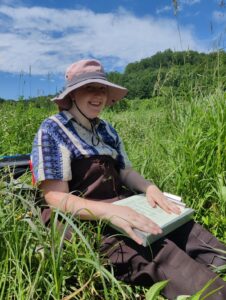The Freshwater Collaborative of Wisconsin awarded more than $4.34 million in funding for the FY24 and FY25 budget years. The 22 funded projects will increase research and training opportunities for high school and undergraduate students and will address Wisconsin’s biggest water challenges, including emerging contaminants such as PFAS and agricultural water management issues such as phosphorus pollution.
A Collaborative Research on Synthesis of Graphene Oxide (GO) from Sustainable Resources and Its Application for Removal of Per- and Polyfluoroalkyl Substances (PFAS) from Water
Institutions: UW-Stevens Point, UW-Madison
Principal Investigator(s): Seyed Javad Amirfakhri, UW-Stevens Point; Xuejeun Pan, UW-Madison
PFAS is a group of chemicals detected in the drinking water of millions of Americans due to their widespread applications. They have been linked to several health concerns. The main objective of this work is to synthesize graphene oxide (GO) from sustainable resources, such as walnut shells, and to investigate the performance of GO for PFAS removal from water. Several students from UW-Stevens Point and UW-Madison will be trained to perform the research. Moreover, they will participate in disseminating the results, collaborating with industrial partners, engaging our community with STEM education, and increasing public scientific literacy on PFAS contamination.
Continuation and Expansion of the Red Cedar Watershed Monitoring Project
Institutions: UW-Stout, UW-Eau Claire, UW Oshkosh, UW-River Falls: $11,400
Principal Investigator(s): Keith Gilland, Nicole Hayes, Julia Chapman, Amanda Little (UW-Stout)
Collaborators: Sarah Vitale, UW-Eau Claire; Jill Coleman-Wasik, UW-River Falls; Greg Kleinheinz, UW Oshkosh; Chase Cummings, Dunn County Land and Water Conservation District)
The Red Cedar Watershed experiences frequent blue-green algae blooms due to phosphorus pollution. Numerous projects have been implemented to reduce runoff and restore stream channels and buffer areas. This project continues to examine the effectiveness of those projects while expanding research efforts to include whole-ecosystem and watershed processes to determine the root causes of the toxic algal blooms regularly seen in lakes in the region. Students from UW-Stout, UW-River Falls, UW-Eau Claire, and UW Oshkosh will work during the summer to survey streams, riparian corridors, and wetlands while also monitoring Lakes Tainter and Menomin to help guide management decisions regarding the Red Cedar Watershed to serve as a model for other similarly impacted watersheds throughout the region.
Continuing the Work of the Data Analysis and Monitoring Crew
Institutions: UW-River Falls
Principal Investigator(s): Jill Coleman Wasik
The Data Analysis and Monitoring Crew (or DAM Crew) is a two-week, hands-on, field-based training experience for UW students who are interested in river health and restoration. Participants work directly with practicing environmental professionals to attain the skills to implement a monitoring plan to assess ecological and geomorphological changes in a riverway that result from dam removal. The DAM Crew is a public-private partnership among UW-River Falls, the City of River Falls, Interfluve Inc., the Kinni Corridor Collaborative, and Trout Unlimited. Participants gain in-demand technical skills, increase their professional network, and serve the River Falls community.
The Cost of Cleanwater: An Efficiency Analysis of Wisconsin’s Water Utilities
Institutions: UW-Whitewater
Principal Investigator(s): Russell Kashian
Students will conduct research through the Institute for Water Business on the efficiency of water utilities and will leverage previous research to identify how costs incurred by water districts in cleaning water leads to inefficiency and increased prices. This research seeks to identify the cost of remediation to provide regulators the information necessary to make informed determinations regarding contaminant assessments. Results will be available in a public report and submitted for peer reviewed publication.
Data Collection and Parameter Estimation for a Dry Bean Yield Response to Irrigation Model
Institutions: UW-Stout
Principal Investigator(s): Keith Wojciechowski
The goal of this project is to help growers manage water resources and potentially increase yield. The research team at UW-Stout will construct automated weather stations and place them in fields containing crops. These stations will collect a variety of weather-related and plant-related data. UW-Stout’s team will analyze this data to help inform the agronomy team at corporate partner, Chippewa Valley Bean, so they can better advise their growers. Students working on this project will help construct weather stations and analyze data. Conducting this research will help these students develop a nascent expertise in precision agriculture.
Deposition and removal of emerging contaminants in the Milwaukee Estuary Area of Concern
Institutions: UW-Madison, UW-Milwaukee
Principal Investigator(s): Inna Popova, UW-Madison; Laodong Guo, UWM
The Greater Milwaukee Estuary faces pollution from emerging contaminants, such as PFAS and pharmaceuticals, posing risks to both the environment and public health. These contaminants are removed from the water through natural processes and accumulate in sediment, where they can persist for long periods, threatening organisms and humans who come in contact with them. The pollution history of these contaminants in the estuary remains poorly understood. This collaborative research project involves the analysis of sediment cores to study the contaminants’ history and behavior. The findings will aid in managing and remediating aquatic contaminations.
Development of a Collaborative Undergraduate Research Experience to Improve Per- and Polyfluoroalkyl (PFAS) Adsorption in Nanoporous Solids
Institutions: UW-Stevens Point, UW-Milwaukee
Principal Investigator(s): Joseph Mondloch, UW-Stevens Point; Yin Wang, Shangping Xu, UWM
Per- and Polyfluoroalkyl substances (aka PFAS) are emerging contaminants in Wisconsin’s waterways. This project provides funding to develop a collaborative undergraduate research experience between UW-Stevens Point and UW-Milwaukee to develop new PFAS adsorption technology. Researchers will test our technology against PFAS contaminated waters including real-world samples from Wisconsin’s waterways. Hands-on experience using start-of-the-art instrumentation will prepare students to enter the workforce with experience in PFAS chemistry, analysis, and treatment.
Engaging Undergraduate Students in Cutting-Edge Research on the Use of Earth Materials for the Removal of Contaminants including Per- and Polyfluorinated Substances (PFAS)
Institutions: UW-Parkside, UW-Milwaukee
Principal Investigator(s): Zhaohui Li, Lori Allen, UW-Parkside; Shangping Xu, Yin Wang, UWM
Polyfluoroalkyl substances (PFAS) are forever chemicals, indicating that they stay in water and the environment permanently. UW-Parkside and UW-Milwaukee will engage 10 undergraduate students per year to conduct cutting-edge research for PFAS and color dyes removal from water. In addition, they will conduct PFAS analyses using state-of-the-art instruments for water samples collected from local drainage and Lake Michigan. The results will help southeastern Wisconsin to develop strategies to remove emerging contaminants from water and to help protect the region from contamination by forever chemicals.
Environmental Science Fair at UWEC: Water, Water, Everywhere!
Institutions: UW-Eau Claire
Principal Investigator(s): Sarah Vitale
This new project is a one-day multi-disciplinary Environmental Science Fair at the UW-Eau Claire campus for up to 100 regional high school students and accompanying high school teachers/advisers. The fair will include hands-on breakout sessions, a panel, a plenary speaker, and a traditional program fair for participants to interact with environmental science faculty at UW-Eau Claire. Freshwater Collaborative programming will be advertised to participants.
Freshwater@UW: An Immersive Undergraduate Summer Research Opportunities Program for the University of Wisconsin System
Institutions: UW-Madison
Principal Investigator(s): Alison Mikulyuk
Collaborators: All UW campuses
The Freshwater@UW Summer Research Opportunities Program provides immersive, hands-on mentored research experiences to 27 promising undergraduates within the 13 member institutions of the Freshwater Collaborative. The program’s central aim is to support the growth of our freshwater research enterprise and freshwater workforce through collaborative, cross-system programming designed to train, recruit, retain and diversify the next generation of freshwater professionals. Funds will support the third and fourth year of implementation and continued program development as we strive to create new, high-impact opportunities for talented students to build their skill and cultivate relationships within the UW System to that will help them seek further training in freshwater science.
Freshwater Science across the Curriculum: Linked Outreach and Advanced Educational Activities in Western Wisconsin
Institutions: UW-Eau Claire, UW Oshkosh, UW-River Falls, UW-Stout
Principal Investigator(s): Sarah Vitale, UW-Eau Claire
Collaborators: Greg Kleinheinz, UW Oshkosh; Jill Coleman-Wasik, UW-River Falls; Keith Gilland, UW-Stout
This ongoing project includes two freshwater science field courses in western Wisconsin: one targeting junior and senior high school students and the other an advanced course designed for upper-level college students. These field-intensive, hands-on learning experiences introduce participants to a wide range of freshwater science topics with specialists from UW-Eau Claire, UW-Stout, UW-River Falls, and UW Oshkosh. Courses are open to students enrolled in high schools across Wisconsin or from any UW System campus respectively.
From Field to Laboratory: Hands-on Techniques for Students in Water Sciences
Institutions: UW-River Falls, UW-Madison
Principal Investigator(s): Bahareh Hassanpour, UW-River Falls; Grace Bulltail; UW-Madison
This course focuses on hands-on laboratory and field techniques for studying freshwaters. Researchers will provide training in practical aspects of field measurements and laboratory practices pre-and post-sampling for students. They will conduct field campaigns for various purposes; will discuss the complexity and uncertainty of fieldwork; and focus on obtaining and preserving samples, and appropriate labeling. The laboratory training will range from day-to-day tasks, such as properly pipetting, keeping detailed records, sample preparation, and storage, to more complex analytic work, such as analyzing water samples using analytical instruments. Faculty will also work with students work on data analysis and poster presentation.
Lead, facilitate, and support policy research for the UW Water Policy Network
Institutions: UW-Milwaukee
Principal Investigator(s): Melissa Scanlan
Collaborators: All UW campuses
The Center for Water Policy leads, facilitates and supports the UW Water Policy Network, which serves as a hub for government agencies, private sector, NGOs, media and other stakeholders to identify water policy collaborators and experts. This project will foster collaboration on water policy research and curriculum across UW System by strengthening relationships among multidisciplinary faculty, researchers and students working on freshwater policy. The center convenes the UW Water Policy Network for presentations and discussions around key policy issues identified in the Freshwater Collaborative of Wisconsin’s 10 Grand Water Challenges.
Mitigating PFAS Contamination of Groundwater: Biochar Sequestration of PFAS in Biosolid Leachate at the Field Scale
Institutions: UW-Green Bay, UW-MilwaukeePrincipal Investigator(s): Kpoti Gunn, Michael Holly, UW-Green Bay; Yin Wang, UWM
Sewage sludge or biosolids generated in Wisconsin are largely applied to agricultural lands. Through this practice, biosolids may be the most diffuse source PFAS contamination of groundwater resources. This project aims to evaluate onsite the PFAS immobilization performance of activated biochar incorporated in soils receiving biosolids, and to develop methods for PFAS analysis of soil and groundwater leachate. Four undergraduate students involved in the project will contribute to experimental setup, soil and water sampling; laboratory and data analysis; and results publication. The project will provide students and faculty with research experience critical to the development of an emerging contaminant workforce.
My River Adventures (MRA) Pre-College Camp
Institutions: UW-La Crosse
Principal Investigator(s): Monica Yang
The UW-La Crosse MRA camp is a six-day residential camp for incoming 7-12 grade students. Students will use the UW-La Crosse campus as their homebase while they enjoy a week of instructional sessions and visits to rivers in the Driftless region for hands-on fieldwork and lab activities in collaboration with UW- La Crosse faculty, local educators and community members. This camp fosters recruitment, access and aspirations for a career in STEM, specifically water-related sectors. Students will create connections with community leaders and educators who can introduce them to career paths and increase their interest in STEM post-high school.
Partnering to Boost Aquaculture Workforce Development in Wisconsin
Institutions: UW-Madison, UW-Milwaukee, UW-Stevens Point
Principal Investigator(s): Sharon Moen, UW-Madison; Dong-Fang Deng, UWM; Emma Hauser, UW-Stevens Point
“Where do we find young people interested in producing fish for food?” This is one of the most pressing concerns that Wisconsin food-fish farmers expressed in a recent needs assessment conducted by Wisconsin Sea Grant. To address this food security and workforce issue, collaborators from the University of Wisconsin campuses of Madison, Stevens Point and Milwaukee are cooperating with commercial fish farms and high schools, colleges, and universities with existing aquaculture programs to expand training opportunities for students across the state. The opportunities range from farm experiences and skill-building workshops to support for teams engaging in an annual aquaculture competition.
Pilot Project: Development of an In Vivo Method to Assess the Innate Immune Response in Fathead minnow Larvae
Institutions:UW-La Crosse, UW-Madison
Principal Investigator(s): Tisha King-Heiden, UW-La Crosse; Gavin Dehnert, UW-Madison
Two undergraduate students will work with faculty from UW-La Crosse and UW-Madison to develop a new bioassay to study the immune response of wild fish. As part of their training, they will job shadow at the Wisconsin State Lab of Hygiene to gain a deeper understanding of how bioassays are used in the field of environmental toxicology. They will meet with experts from the Wisconsin Department of Health to see how data from these bioassays can be used to inform water quality standards. Finally, they will network at science conferences to learn about job opportunities in the field of environmental toxicology.
Quantifying the Impact of Spatial and Temporal Variation in Hyporheic Zone Fluxes on Phosphorus Transport and Release in Wisconsin Streams and Rivers
Institutions: UW-Green Bay, UW-Madison
Principal Investigator(s): Erin Berns-Herrboldt, UW-Green Bay; Christopher Zahasky, UW-Madison
Riverbed sediments can be an important source of phosphorus to Wisconsin waterways, driving eutrophication and negatively impacting aquatic health, human health, and local economies. There is limited understanding of how groundwater–surface water exchange impacts river sediment phosphorus storage, and this study aims to quantify these processes. Students will characterize phosphorus and subsurface hydrology in stream sediments at two sites in central Wisconsin and conduct batch and column experiments on sediment samples to evaluate which biogeochemical conditions promote storage and release of phosphorus. Project findings are anticipated to inform land, nutrient, and water management decisions.
Training K12 Educators in Groundwater Science
Institutions: UW-Eau Claire
Principal Investigator(s): Sarah Vitale
This project entails a one-day groundwater workshop with K-12 educators in the Eau Claire Area School District, and a hands-on classroom experience for each participating educator with UW-Eau Claire faculty and undergraduate students. The workshop will include exploration of groundwater characteristics using physical flow models, field experience on the UW-Eau Claire campus well field, and a tour of the Eau Claire Municipal Water Treatment Plant. Participants will receive a groundwater model to keep and use in their classroom. The follow-up classroom experience will provide an opportunity for educators to see groundwater models used with their students and build connections to support other Freshwater Collaborative programming.
UW-Green Bay Pre-College Student Experiences in Freshwater, 2023-2025
Institutions: UW-Green Bay
Principal Investigator(s): Emily Tyner
UW-Green Bay Pre-College Student Experiences in Freshwater is the continuation and expansion of a project that will enhance community-based experiential learning opportunities for pre-college students and teachers around the Green Bay and Lake Michigan watersheds. The project will build a community of freshwater-focused educators and middle and high school students, link to statewide water experts, and engage a diversity of urban to rural communities within the UW-Green Bay region. Intended outcomes include building skills and career-oriented experiences for high school scholars interested in the water sector, recruiting students to UW-Green Bay and UW System water-centric programs, and expanding efforts toward equity, inclusion, and diversity of participants.
UW Oshkosh Comprehensive Freshwater Collaborative of Wisconsin Training, Community Engagement, Business Enterprise, Research, and Recruitment Program
Institutions: UW Oshkosh, UW-Eau Claire, UW-Stout
Principal Investigator(s): Greg Kleinheinz, UW Oshkosh
Collaborators: Sarah Vitale, UW-Eau Claire; Amanda Little, UW-Stout
UW Oshkosh will offer student training opportunities at the Environmental Research and Innovation Center (ERIC), a state-certified laboratory for many water testing parameters as well as a contract R&D laboratory for various community and industry projects. The partnership with the Freshwater Collaborative allows students from any UW campus opportunities to work at ERIC field research sites (or take a field course) each summer, which embeds students in communities to study surface, well and groundwater. Funding from the Freshwater Collaborative will also allow for an on-campus STEM high school camp in summer 2024 (20 high school students). It will also provide resources for faculty-student research and student-industry projects. Freshwater Collaborative funding will continue to expand opportunities through the UW Oshkosh Freshwater 101 course (BIO/ENG 119) and partial support for a summer field sampling and analysis course open to all UW students. Finally, UW Oshkosh will continue to offer access to a research and teaching boat on the Lake Winnebago system at no charge to Freshwater Collaborative partners.
Water, Health, and Habitat Interactions: Building Capacity for Water Careers and Education
Institutions: UW-Milwaukee, UW-Green Bay, UW-La Crosse, UW-Parkside, UW-River Falls, UW-Whitewater
Principal Investigator(s): Tracy Boyer
Collaborators: Chris Houghton, UW-Green Bay; Tisha King-Heiden, UW-La Crosse; Julie Kinzelman, UW-Parkside; Kevin Thaisen, UW-River Falls; Elisabeth Harrahy, UW-Whitewater
UW-Milwaukee will lead a collaboration with five UW campuses to implement three intensive hands-on courses that were developed specifically for the Freshwater Collaborative. These summer courses will provide undergraduate students throughout UW System with an affordable opportunity to conduct research and field work on Lake Michigan. These courses also create a nucleus of classes for future planned freshwater certificate offerings.
This project will also expand a UWM field course, based on feedback from industry partners, to make it more accessible to students on other campuses or those working full time. Faculty will also build an intensive series of specialized aquaculture courses that complement workforce development efforts. In addition, UWM will host a daylong field work experience aboard the R/V Neeskay for undergraduates participating in the Freshwater@UW Summer Scholars Program, a statewide Freshwater Collaborative initiative led by UW-Madison that places undergraduates in research programs throughout UW System.
Collaborative Course Offerings Include:
- Environmental and Health Effects of Water Pollution. This is the hands-on component of a two-part course taught jointly by faculty from UWM, UW-La Crosse and UW-Whitewater.
- Expedition to Lake Michigan. This hands-on course, taught by UWM and UW-River Falls faculty, focuses on the hydrology and biogeochemistry of Lake Michigan and incorporates a problem-based approaches to solve real problems affecting Lake Michigan.
- Human Interactions with Lake Michigan Coastal Ecosystems. This four-week course led by UWM, UW-Green Bay and UW-Parkside explores the coast of Lake Michigan and will facilitate a greater understanding of human impacts on its coastal ecosystems.



